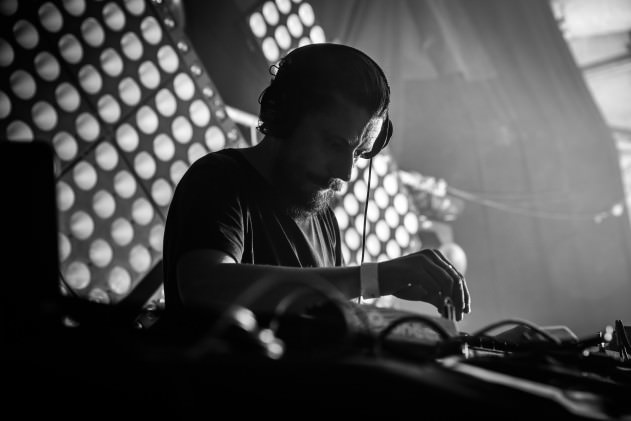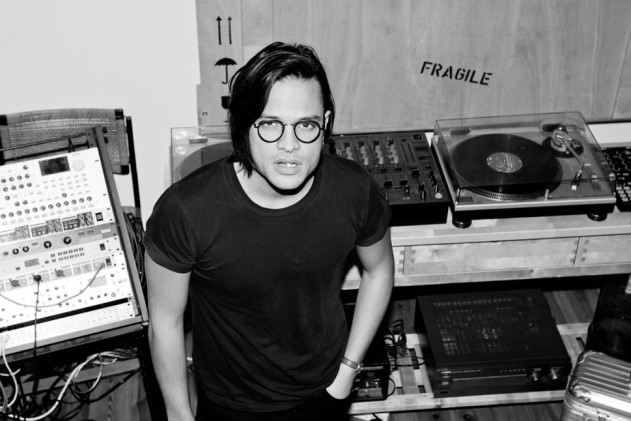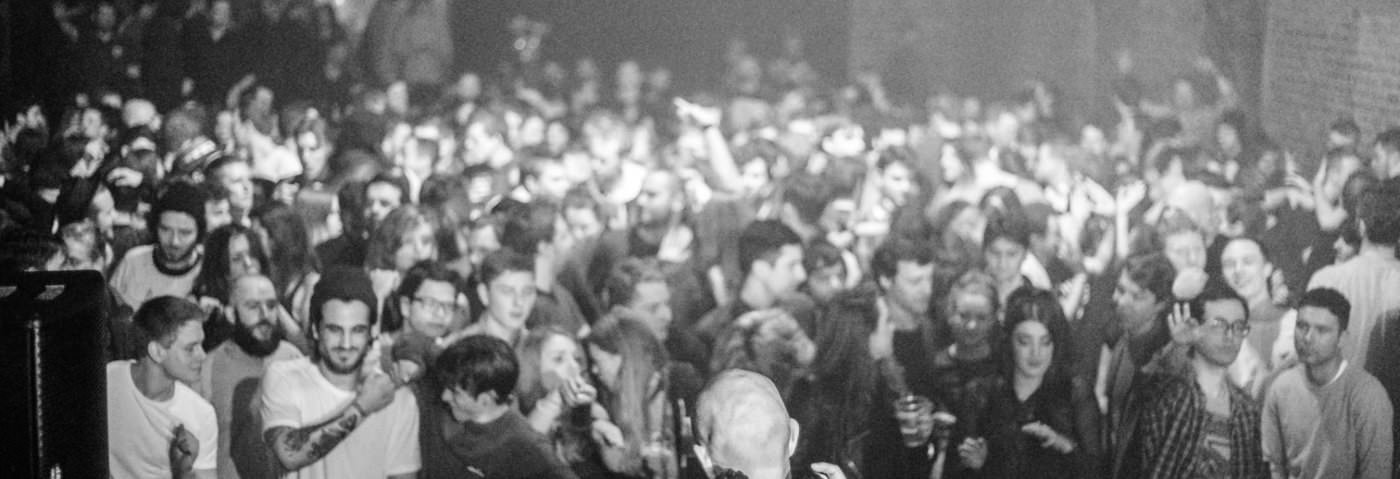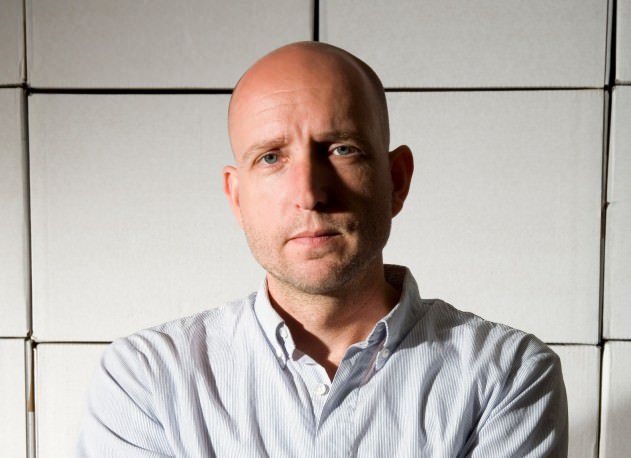Serge
The Clone boss might be the shyest and most polite DJ you know, but he is also one of the most versatile and uncompromising selectors working today.
If you are a DJ and you want to educate people, you should have become a teacher. I always find that such nonsense. What makes a great DJ is to share your enthusiasm for tracks that you love, play tunes that you love, to share them with your friends… but not to educate a crowd.
If you are a DJ and you want to educate people, you should have become a teacher.
A DJ for me is someone who plays great music and who sets the atmosphere of a night, who is a slave to the location and the event and most of all to the crowd. However, it’s not a submissive role – probably the opposite. I see it as a strange conflicting role. You need to please and entertain the crowd in some way, to make them listen and dance to your music, but in your own way without losing your own style, taste and aesthetics, and do it with creativity, fantasy, a certain character that comes unique with each person.
Each DJ is different, has a different character, so I would never say, like DJ Harvey said, that a DJ must be an entertainer, because that is simply not correct. Each DJ makes his own role fit to his character, his taste and feel for aesthetics and the crowd that he or she wants to play for. And even though, often, the most extrovert and outgoing characters are the most popular DJs, I don’t think they are automatically the best DJs. That stardom and pop star thing became more important in the recent decade, however we shouldn’t mix up popularity with DJ quality or skills. And neither should we do it the other way around. You can play the coolest records all the time, but how much worth are you as a DJ if you clean out the dancefloor gig after gig? It can happen, it does happen, but I don’t see this as skills or an accomplishment, even while playing the best tunes on the planet. However, you also should have the balls to just clean the dancefloor and say fuck it… and try to prove you’re right and stick to your own aesthetics and taste, and sometimes just accept you’re at the wrong location at the wrong moment!
DJing has changed, of course. It has become a business, with business rules. More and more agents and managers know how things work and how they can launch a career. Many DJs are true social media heroes and spend more time on Facebook and Twitter than digging for tunes or recording tracks. However there is also a growing educated and smart crowd, thanks to that same internet, that is open to the new and the different, and who don’t need instant entertainment.
I think reading the room is probably the most difficult and most important thing, unless you just play the same floor fillers every set and just don’t care. But even then, you somehow need to know when to play what tune, and not to ruin certain tunes by playing them at the wrong moment when they have hardly any effectiveness. Certain tunes are so popular they always work, but maybe even more important are the goosebump tracks or the special ones that otherwise would clean out the dance floor when you play them at the wrong moment.
Sorry to sound like an old fart, but I think DJing is easier these days. I wouldn’t say the standard is higher now or back then, but you can easily become a working DJ when you know how to produce some popular tunes and let your manager sort you out with some gigs and just play tunes for one or two hours with the sync button or from your computer with Ableton. That’s something different then playing a full night by yourself – vinyl only, of course – for a mixed crowd, going from disco to pop to house to whatever, pleasing the dancefloor and the club owner.
the club owner came up to me quite often when I played too much house... too much house wasn't good for the bar turnover, so he gave me that look
An all-nighter was a standard thing 20 to 30 years ago – there was usually no line-up announced. Back then I remember the club owner came up to me quite often when I played too much house… too much house wasn’t good for the bar turnover, so he gave me that look that I had to make sure they’d sell some beer. Actually, that stopped at some point around ’91 or ’92 when he found out he could make money by selling pills too [laughs]. From there on, it was house music all night long!
I’d say it’s easier to be considered a good DJ nowadays. Maybe my view is a bit biased, but here’s an example: I’m playing a decent set and building towards the headliner who’s on after me, so I play a last couple of tunes that slow down a bit as I don’t think it’s always nice to end with peak time bangers when the headliner is about to begin. All of a sudden, when I mix in that last tune, the crowd goes wild. I look up, all surprised. That tune wasn’t a hands-in-the-air tune, but it turned out the headliner stepped on the stage, and by just seeing him they all started cheering and shouting. Other problems come along with being famous, I guess.
I never really thought about my own approach to DJing, but I’m a music lover and record collector with a rather introvert character, so I didn’t start DJing to entertain or be in the spotlight, but just because I really loved the music and because I wanted to hear specific tunes and share that. So that’s basically what I still do.
I think I always have a certain goal I want to achieve, like playing certain tracks and making them work, but I guess that’s more or less it. It is actually very intuitive: it’s not that I try to manipulate the crowd, but I just try to make some kind of connection by playing tunes I like and hopefully the room likes them as well. I don’t know. It probably sounds a bit pretentious, but I don’t like to randomly just drop some tunes as I need some direction and something to work towards. I guess that’s also the reason why I often start slowly and feel the vibe and then slowly go towards where I want to go. Sometimes I don’t succeed and there is very little connection and I simply don’t reach my goal. That doesn’t mean it’s a bad night – sometimes the crowd leads me somewhere unexpected, and maybe that’s even nicer.

Krysko
The definitive, career-long resident DJ who has more skills than many superstars and consistently proves his worth at The Warehouse Project as well as many other clubs and festivals around Europe. Now also a radio jock on KMAH.
In the traditional sense, the resident has a completely different relationship with the crowd than a headliner. Once a good resident has established themselves with a crowd at a particular night, it’s like ordering a favourite dish from a takeaway: you’re happy with it, you know it’ll never let you down, you’re comfortable knowing it’s always there, but the headliner is when you try something different. Sometimes it works, sometimes you’re let down.
As a resident, you’re there to initially ease the crowd in and to leave the headliner at a point where they can do what they want, with a crowd that's primed for it
If a resident is warming up, it goes without saying that you’re there to initially ease the crowd in and to leave the headliner at a point where they can do what they want, with a crowd that’s primed for it. Then it’s up to them. That’s a more traditional view of a resident and headliner, though – nowadays many nights have residents and guests who are equally matched in terms of reputation and following, and that gives a much more dynamic feel to a night. When nobody is the ‘superstar’ there’s no differential.
For me, the smaller the room, the more reward you get from reading it and then in turn getting it right. It’s the thing of ‘looking into the whites of the eyes’: you can really lock into smaller rooms then gauge from them where you can take it. I think larger crowds are happy to be dictated to, whereas if the environment is more cosy you’re able to take in the general feeling of where they want to be led.
The guiding principles of a DJ should be that of willingness to adapt, by having a wide enough knowledge of their music to be able to do this but still remaining within the music they love. The huge spectrum of new music available within genres nowadays, alongside the back catalogues, means there’s no reason this can’t be done. I mean, how do you even know ‘what crowds want to hear’? they don’t fill in a questionnaire at the door. I think you have to be confident enough to give them credit that they will be open to what you do.
What makes a great DJ is the ability to make it look easy, and I mean truly easy. I completely understand the fact it’s not brain surgery, but in this age where countless tools are at the disposal of people who want to go out and DJ, the medium is often made a focus over the art. A truly great DJ exudes effortlessness when they play, whether that be crossing different genres, properly managing the system they are playing on, knowing its limits or generally understanding the room very quickly. The technical thing for me comes way down the list.
I couldn’t give a shit if a DJ drops a mix every now and again or hardly mixes at all. It’s about creating your own environment for the time you’re on and doing it in a way that works for that time and place.

Argy
New Bedrock signing Argy is as classically informed both in the studio and DJ booth as you would expect from someone from Greece.
For the uneducated audiences, hearing a certain name over 20 times makes someone a known DJ. Then that DJ becomes ‘great’. For the rest of us, we judge people depending on our mood, ego and insecurities that day, because we are artists and how we feel about others often has to do with how we feel about ourselves.
The art of DJing is always going to be the same. You make tracks in the studio or you go play tracks in a club. The way of making a living changed.
Reading a room is crucial and that’s a craft you keep developing and it takes years to master. Experienced DJs walk into a room and within five minutes they know what’s happening and which direction they need to take. Look what happens when artists that only have studio experience start to perform as DJs in clubs in order to survive. It’s usually a disaster the first few years and thats why I encourage some of them to stick to playing live.
I think that the people who follow artists just because of a high poll position are greater in number than the actual connoisseurs or blog-heads who hate ‘bigger’ names because of their own reasons.
Reading the room also demands your ego to be in place, and that’s why it’s hard these days for some DJs. Your music selection will never shine if it’s not presented correctly and cohesively. You really need to be on point with both.
At the end of the day, it’s all about what comes out of the speakers. You can play a vinyl record that has a track on it made under the worst conditions, without knowledge and with the crappiest equipment, and just because it’s on wax it doesn’t make it better. I think that the people who follow artists just because of a high poll position are greater in number than the actual connoisseurs or blog-heads who hate ‘bigger’ names because of their own reasons. The first group is not demanding at all, whereas the second group is unreasonably demanding.
For me, growing up on small Greek island that has nothing to do with electronic music shapes up a way of seeing things – a perception not so common in the industry, I think. And perception is the key to many doors and what makes you stand out, even unintentionally! Being naive helps you a lot with original ideas.


10.31 PM
Dave Clarke is the only one you need to read here.
“I never really read the room. I just come in and play music I like, but then I ride on the mood of the room.” is a pretty interesting idea- the opposite of what many other djs say, but i think he is correct: play as yourself and get the crowd to join you.
10.45 PM
Great article. Dave Clarke’s comments are great.
Kids getting into DJ-ing these days have no idea how long it takes to learn how to beat match and mix tight on an old pair of Sound Lab belt-drive decks, while you spend 5 years to saving up for a set of 1210s.
That aspirational aspect of starting at the very bottom and teaching yourself the art and then finally affording the pro-standard tech is almost non-existent now.
Cheap laptop, cheap controller, auto-sync, off you go…
11.57 AM
I remember when I hit my first beat match on some real bad belt driven Numarks. I let both whole tunes play out perfectly beat match, then pulled them up and did it from the top again. Was a great feeling.
11.57 AM
Obviously I was in my bedroom alone at the time, you know how it goes.
03.12 PM
i started and finished back in the days where vinyl was the only serious option and can only shake my head at all the noise against digital djs. A dodgy set of decks and records is great to learn on if that is the only way music should ever be presented, but 2 or 3 decks and a mixer is only useful for doing the same thing over and over again. I have a feeling that Larry Levan would be would be using a laptop these. He wasn’t so elitist or conservative, and many of his then contemporaries (francois kevorikian, david morales, etc) have switched.
04.16 PM
Props to Dave Clarke for keepin it real…..somebody had to say it. Good DJing is about taste and you can’t teach taste. You either have it or you don’t. There’s no taste button like there’s a SYNC button. Across ALL genres now it’s about name dropping and backslapping.
04.46 AM
@nostaldont
Most people who criticize digital DJing don’t do it on the basis that the format itself is bad or unworthy, but that the barrier to entry is lowered. You can afford to be responsive toward the crowd and imaginative with your selections if your record collection is broad and deep enough, so I don’t know about doing the same thing ‘over and over again’ either
01.00 PM
THANKS FOR THIS ARTICLE! cheers from Manila Underground and TIME in Manila xx
02.13 PM
Great article.
04.29 PM
Don’t sit on the fence Dave. Tell us what you really think…. 😉
02.50 PM
“New Bedrock signing Argy is as classically informed both in the studio and DJ booth as you would expect from someone from Greece. ”
Umm.
What?
01.57 PM
Great article, and agree that Dave Clarke is on point with his comments here.
The debate about belt drive vs 1210’s vs cd vs mp3 and controller becomes moot when you get into the passionate about music argument. It is without doubt as easy as you want it to be to mix now but the excitement of playing great, and possibly, new music to a crowd is an intoxicating thing to do and if you can push that feeling out and into the crowd, how you do that is slightly irrelevant.
10.21 PM
This was a brilliant article. I really enjoyed hearing the opinions of respected Djs. They are spot on with their thoughts and make me want to perfect my craft event more. Thank you Attack!
04.26 PM
Saw Mosca in London a few weeks back and he was shite. ‘Trying’ to do his ‘thing’ and pissing everyone including the crowd, the promoters and the guy who was after him off!
12.55 PM
Dave Clarke was the best one on here and I give him credit for speaking the truth. The others I rarely heard of, not a good list of artists to take notes from.
04.12 PM
So what? You just living in the past talking bout playing music u love. That is shit talk its all about pleasing the people. So u come with your turn table and I come with my controller. You play all the music you love and i play to move the crowed and see who will get hired. Stop fighting down new age djs if you like to ride horse we like to drive cars. Its just new technolgy so get up to the time you old fowl
11.17 AM
Dave Clarke and Mr. G spoke to me the most. Mosca sounds like a complete moron.
08.59 PM
Darren, you sound very ignorant. Please consider the idea that “getting hired” or monetary sucess, does not necessarily define the word “success” entirely.
Especially when you’re talking about the subjectivity of things like art & music.
04.46 PM
Mr.G knows the score. It’s not about mixing or tricks or filters. It is all about selection, knowing your tunes and knowing when to play them. You can take a crowd anywhere if you play the right tunes in the right order. Read the crowd. Two different nights the same set won’t work. Play the tunes you love and create a vibe the room can ride. It’s a two way process.
You have to play to the people who are leading the room too. Watch out for the crazies that are loving it. They create the buzz. They are the ones that lead the dance!
02.22 PM
I agree to a certain extent, ERob. However it’s not just about selection, mixing technique is also important.
Some genres of dance music are less amenable to “showing off” on the decks than others. There’s nothing quite like hearing a massive DnB double drop that’s been EQ’d perfectly – pure dancefloor destruction. Only possible because the DJ has great technique.
House and techno, on the other hand, are less about those dynamic moments, and more focussed on creating a groove, so in that situation I would say selection is king.
08.32 AM
Darren is one of those djs that before he goes to club (if ever) he check facebook what people are posting.. Well Darren just sit back and buy todays top 100 on beatport. That must be it.
01.34 PM
My understanding from this article:
Play music that you love. Coz if you feel the vibe, it spreads quickly on the dance-floor. Playing music for people, what they like, is acting like a Jukebox, not a DJ.
Passion and love of music is of key essence, and spend alot of time digging deeper into it.
Well, some people will miss the flying cakes, bananas and champagne, etc etc, with my music, but well, you can’t please everyone
08.56 AM
Darren, you are mistaking getting local 100 quid a night gigs with being a respected DJ.
08.38 PM
“Back then”
“Back then”
“Back in my day”
“15 years ago”
“20 years ago”
“Before Technology”
“Before the internet”
so much we can learn from the previous gen of DJs and they usually just end up sounding condescending and nobody (especially punters) really care tbh
06.38 PM
lebron, if you lived in the UK (u may do) you would see a once great club scene (not just since 88 and Acid House) but through the 80’s with New Romantics then The Hip-Hop/rare groove scene, the soul scene which was massive from the Mod clubs of the 60’s to Northern Soul (which has a direct link with the Acid House/Balearic then rave explosion from 88-92/3 and it’s not bigging it up but true to say without that you wouldn’t have the global dance scene of now – apart from the German techno scene) to the Soulboy/Soulgirl movements that I grew up in during the early 80’s. I’m sorry to tell you that house/techno/dance music clubs in 89-94 here piss all over what’s left of house type clubs now. They are a million miles apart and I’m not being condescending as I still occasionally go to them and it’s just sad. A load of people huddled together like a swarm of bees all facing the DJ (I haven’t a clue what that’s all about) who is playing a seamless mix of tech House all at the same BPM, no slow build up of their sets, no dropping big tunes (are there any?) on The One when you’re least expecting it and no smiling punters.
The club scene here is being decimated. The kids who are DJing take all their tips from Youtube tutorials and are ruled (and constrained) by the constant steam of Tech being pushed at them, the importance placed on perfect mixing has taken over from playing great tunes, being creative and original in what you play and knowing the music old and new. People here who would once have been anticipating the guaranteed excitement of the weekend (as I did) go to the pub. How can you say that some of the biggest DJs around are being condescending. Are you saying they don’t know what they are talking about as that’s just ridiculous? Most of what they say I’m afraid is fact.
04.26 PM
Why weren’t women included in this???
10.07 PM
People ask me all the time and playing from gut works everytime, I trust it 200%…:)
03.51 PM
Lil Louis, mentioned by Mr G here, made me cry last time I heard him play a month ago. Truly house, truly techno.